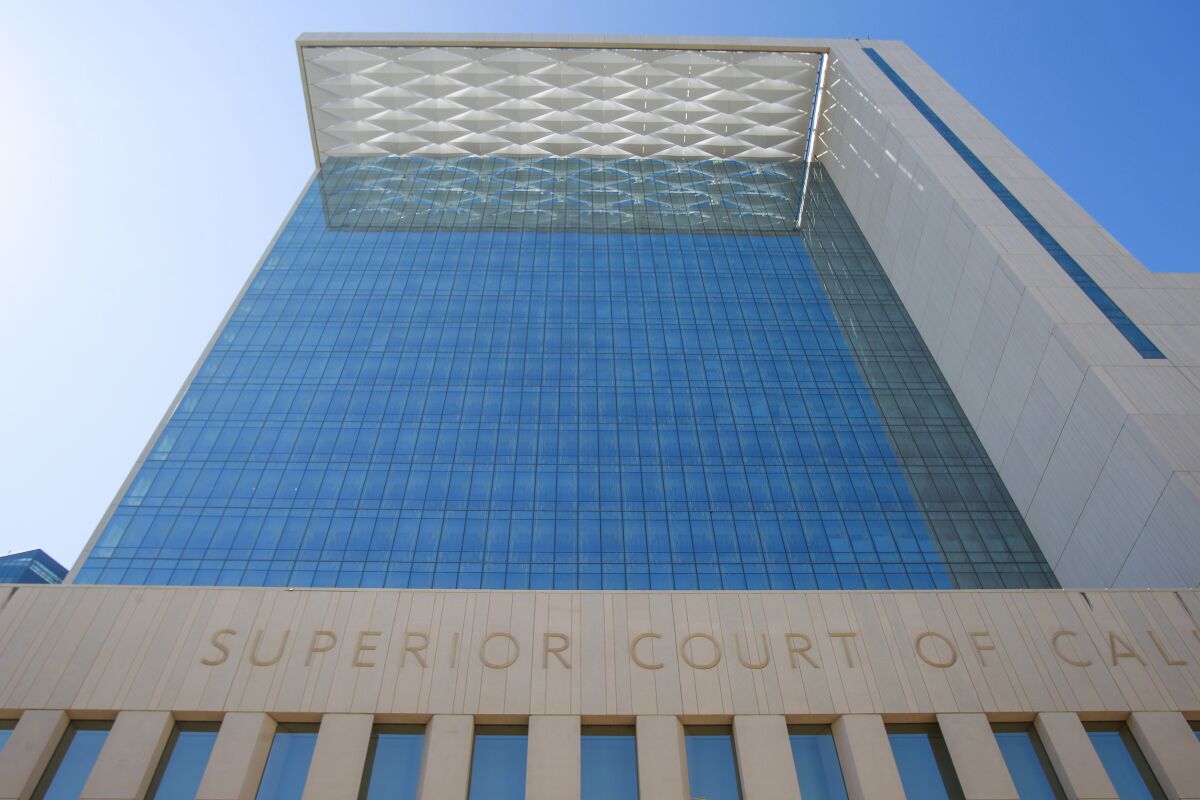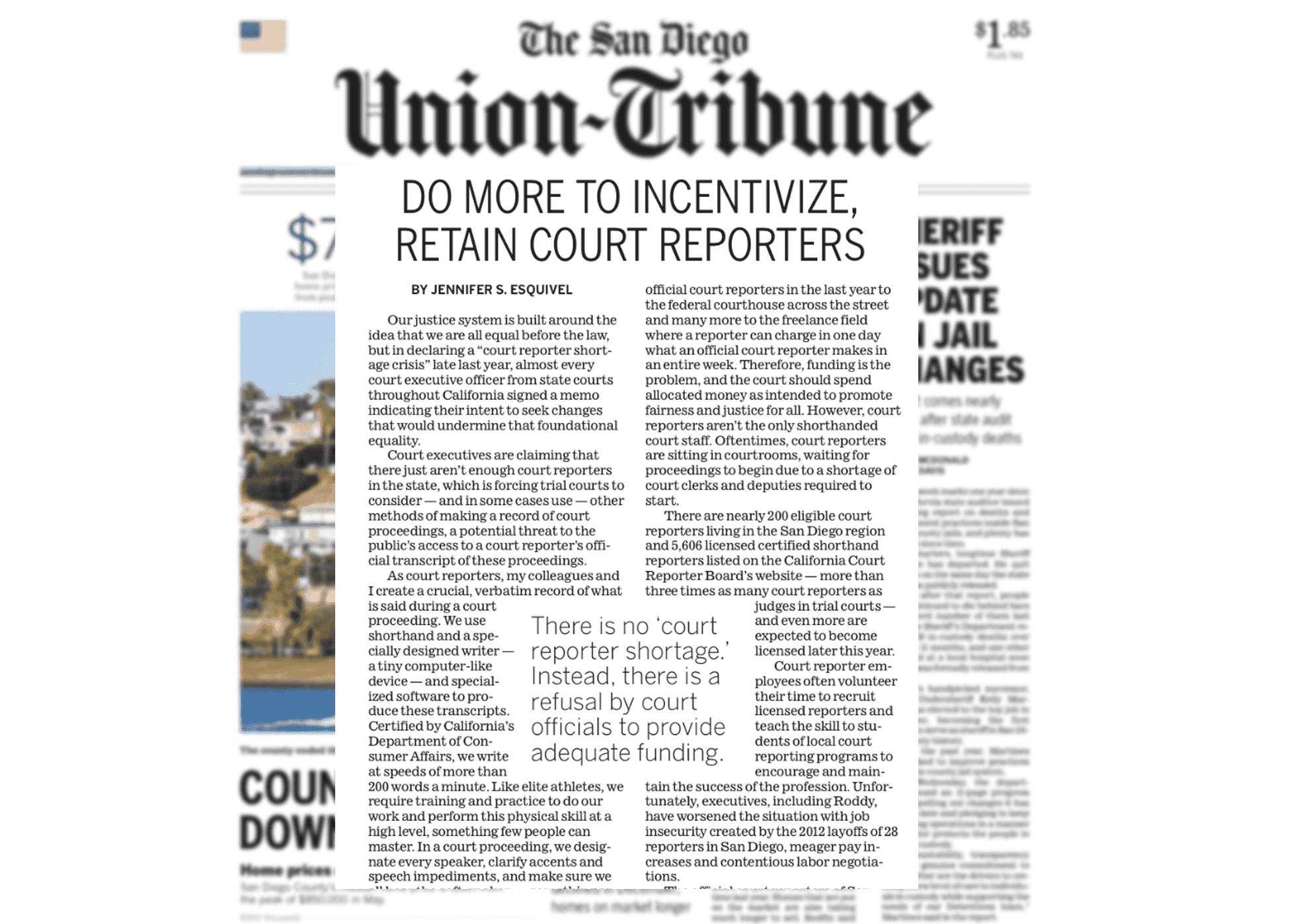Opinion: California has a compensation crisis, not a court reporter shortage
By Jennifer S. Esquivel
The San Diego Central Courthouse in Downtown San Diego.
(Hayne Palmour IV/San Diego Union-Tribune)
Esquivel is a certified shorthand reporter and an SEIU Local 221 labor union executive board member representing courts/special districts and lives in Mission Valley.
Our justice system is built around the idea that we are all equal before the law, but in declaring a “court reporter shortage crisis” late last year, almost every court executive officer from state courts throughout California signed a memo indicating their intent to seek changes that would undermine that foundational equality.
Court executives are claiming that there just aren’t enough court reporters in the state, which is forcing trial courts to consider — and in some cases use — other methods of making a record of court proceedings, a potential threat to the public’s access to a court reporter’s official transcript of these proceedings.
As court reporters, my colleagues and I create a crucial, verbatim record of what is said during a court proceeding. We use shorthand and a specially designed writer — a tiny computer-like device — and specialized software to produce these transcripts. Certified by California’s Department of Consumer Affairs, we write at speeds of more than 200 words a minute. Like elite athletes, we require training and practice to do our work and perform this physical skill at a high level, something few people can master. In a court proceeding, we designate every speaker, clarify accents and speech impediments, and make sure we all hear the soft-spoken — something an electronic device without a human ear and voice to interrupt cannot do.
This record is critical for appeals to have an accurate word-for-word transcript of divorce proceedings, criminal trials, restraining order hearings and more.
Electronic recording consistently proves unreliable and does not represent equal access to justice. Recordings of court proceedings are often lost or not made at all when the software malfunctions or a court employee neglects to start the electronic device. Additionally, off-the-record discussions between attorneys and their client are privileged and recording of such conversations is prohibited. Can people be sure the machine was turned off when speaking to their attorneys during breaks in the proceedings?
If hearings do not provide court reporters, ultimately, the wealthy — those who can hire the best attorneys and pay thousands of dollars for court reporters to make an accurate record of their court proceedings — would have an even bigger advantage in our justice system than they already do. And people of color, already disproportionately impacted by our justice system, would face higher costs for access and harsher penalties.
Michael Roddy, the executive officer of San Diego Superior Court, has declared that funding is not the problem with this so-called “court reporter shortage.” Unfortunately, Roddy is refusing to spend the millions of dollars that have been allocated by the state to incentivize applicants and encourage reporter retention.
San Diego Superior Court received more than $2 million last October via Senate Bill 154, funding specifically allocated for official court reporters’ retention and recruitment this fiscal year and, to date, has spent none of it — none — while courts across the state are now offering tens of thousands of dollars in sign-on and retention bonuses.
San Diego Superior Court has lost four official court reporters in the last year to the federal courthouse across the street and many more to the freelance field where a reporter can charge in one day what an official court reporter makes in an entire week. Therefore, funding is the problem, and the court should spend allocated money as intended to promote fairness and justice for all. However, court reporters aren’t the only shorthanded court staff. Oftentimes, court reporters are sitting in courtrooms, waiting for proceedings to begin due to a shortage of court clerks and deputies required to start.
There are nearly 200 eligible court reporters living in the San Diego region and 5,606 licensed certified shorthand reporters listed on the California Court Reporter Board’s website — more than three times as many court reporters as judges in trial courts — and even more are expected to become licensed later this year.
Court reporter employees often volunteer their time to recruit licensed reporters and teach the skill to students of local court reporting programs to encourage and maintain the success of the profession. Unfortunately, executives, including Roddy, have worsened the situation with job insecurity created by the 2012 layoffs of 28 reporters in San Diego, meager pay increases and contentious labor negotiations.
The official court reporters of San Diego Superior Court want to work for everyone as public servants and guardians of the official record, which is why so many of us are still serving the public at local courthouses.
Executives, including Roddy, need to protect access to services by spending the funding allocated to San Diego Superior Court before the end of this fiscal year or the money will be lost.
As civil rights leader and Rep. John Lewis said, “a democracy cannot thrive where power remains unchecked, and justice is reserved for a select few.”


